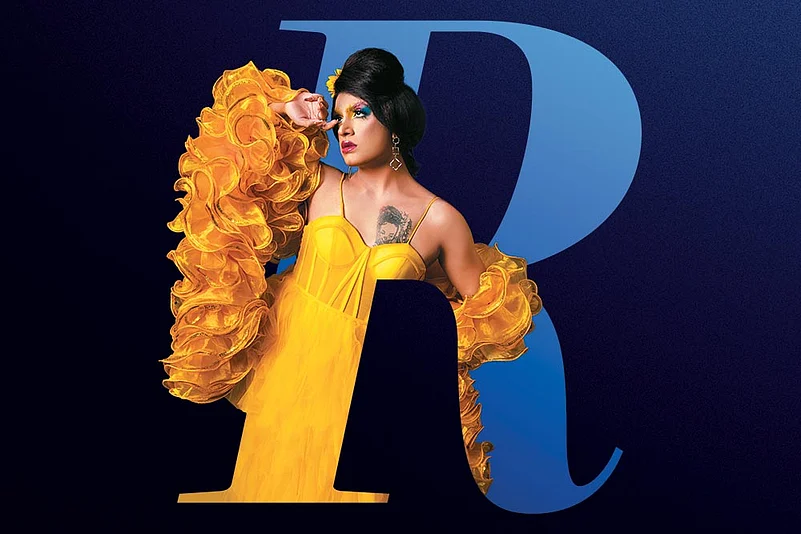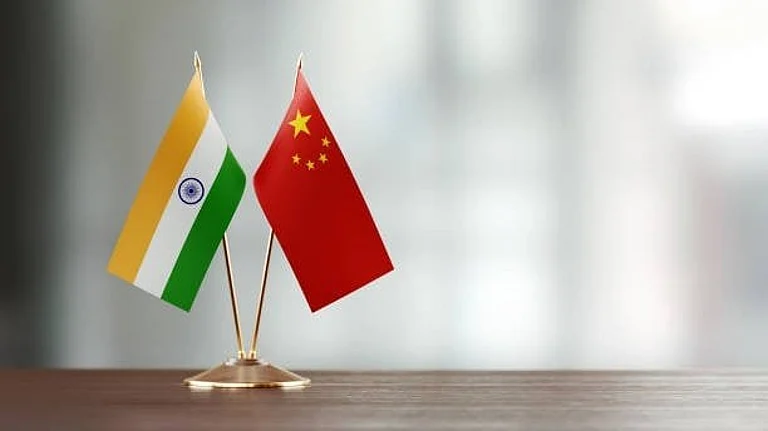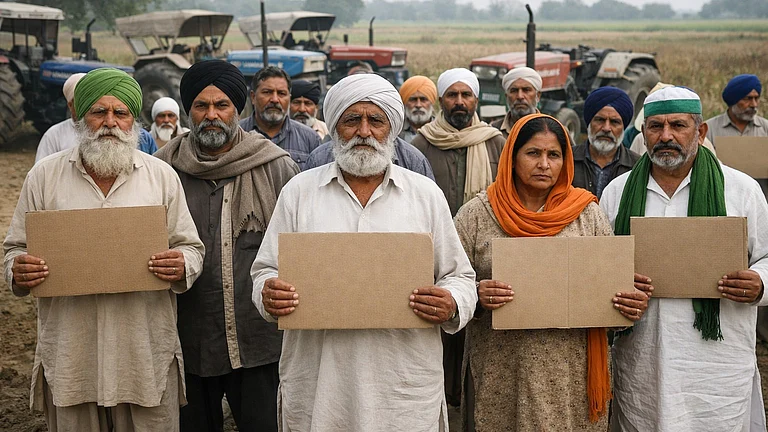“You are not my gay child or my straight child. You are my child.”
That’s how Sushant Divgikar’s father assured him when he came out as an 18-year-old in 2008. As an emotional Divgikar recounts how his family and friends have always stood by him, he is acutely aware that most teenagers across the country are still deprived of this privilege of support.
Over the last 13 years since he came out, Divgikar built a multi-hyphenated career as a model, singer, performer and drag icon. But it is perhaps his role as an influencer that has helped him reach millions and inspire them to be open about their sexuality. When he transforms into Rani KoHEnur, his drag queen avatar, the stage becomes his world. Divgikar, whose preferred pronouns are he, she and they, dismisses his influencer tag and says he doesn’t understand such concepts. “If that one kid who’s watching and listening to me in a village or a smaller city says, ‘Agar Sushant kar sakta hain toh hum bhi kar sakte hain’ (If Sushant can do it, so can we), I have succeeded in giving him representation. He needs examples of empowerment,” says Divgikar who has come out twice—first as gay during his teens and more recently as transgender.
It is social media that has helped that kid in the village have a reference point and Divgikar become a voice for the community. “You see so many kids that are today’s stars and are celebrated, regardless of whether they come from a bungalow or a chawl. They are all celebrated for their talent and I think that is the beginning of a change,” he says.
Brand expert Harish Bijoor, founder, Harish Bijoor Consults Inc, explains the great leveller that social media has been and through which content creation has been democratised. “Work, therefore, comes to all on social media. In many ways, this is social media justice! And justice for all,” he says. As social media democratises personal freedom, where instances of society moulding young people into conformation to the heteronormative agenda are commonplace, Divgikar vouches for the transformational role of education to create a country of equals. “In any society, education is sensitisation. If you don’t teach me about the transgender spectrum, how will I know myself?” he asks. “It’s not all right to suppress,” he adds emphatically. Along with education, there has to be awareness and government support through policies and funding for the winds of change to sweep away colonial-era notions on sexuality from our society.
For Divgikar, his role in influencing the government to push for policies with sensitisation workshops, release funds for creation of safe spaces and special amenities for transgenders, and open grievance cells in organisations are as important as ensuring he endorses the ‘right’ brands.
“As an influencer, my brand endorsements were a by-product of me putting out my content because where else will I put out my content when people are not giving transgenders work? I earn my livelihood through endorsements. Would you rather have me stand on the street? I don’t want to do that. If you want to call me mercenary and shallow, so be it,” says Divgikar. “I stand to support brands that are not pinkwashing,” he adds, unequivocally.
While Divgikar, who has 128,000 followers on Youtube and 1.2 million followers on Instagram, has done campaigns for Anastasia Beverly Hills, Shoppers Stop, CRED and many more, he has said no to several others. One of them being a film where his role bordered on token representation without the opportunity to showcase his range as a singer.
Divgikar is appreciative of the increasing freedom of sexual preference around him but is pragmatic to note that once Rani KoHEnur’s performance is over and the applause has died down, the world continues to be harsh—a world where, as a 16-year-old, he had to face rejection after rejection at auditions for being ‘too gay’.
“So, if you don’t fall into the binaries of gender, you are not normal. It pains me to see transgender sisters living and begging on the streets. If my parents had disowned me, I would have also been on the streets. We all deserve a life of dignity,” says Divgikar. “We have been discriminated against for so long. Basic amenities like toilets have not been created. Shouldn’t you be ashamed of it? If straight people have so many problems with us then ‘humse taxes kyun letey hain’ (why do you collect taxes from us)?” asks a visibly agitated Divgikar as he loses his composure for the first time in an hour-long conversation. “You give me the same rights that you’re giving the heterosexuals, that’s all. We don’t want reservation, but want equality,” he adds.
He lowers his guard and tells us how pop culture and Bollywood have let his community down. “Growing up in the 80s and 90s, there were very few reference points for me. I take Laxmi Narayan Tripathi and Ashok Row Kavi as my inspirations. Bollywood has the potential to be such a huge influencer but it has reduced us first to caricature, and then to tokenism,” he says and then jokes: “But that’s in an ideal world. And in an ideal world, I would be married to a very handsome and intelligent man!”
OTT platforms are improving representation for the LGBTQ+ community and with it, Indian brands are also evolving their stories. There might be opposition to Dabur’s recent ‘lesbian Karwa Chauth’ ad and floodgates might not have opened but the wave of change has already hit the shore with the Amul ad in 2009 and ads of other brands like Bhima Jewellery, Levi’s, Titan, Fastrack and the list is increasing.
“There are a few associations I am most proud of: First, the opening of transgender clinics in Hyderabad with the John Hopkins University, being the brand ambassador of Kitty Su, (the Lalit Suri Hospitality Group’s destination nightclub) where Rani KoHEnur was born. Then the #StopTheBias campaign of Shoppers Stop,” says Divgikar.
Three years after the annulment of Section 377, economic opportunities for the LGBTQ+ community are increasing. “Transgenders lived in a world of work which did not connect them optimally to the world at large. Physicality was a boundary that constricted their reach, presence, interactivity and impact. Social media leveled it all. Today, with Instagram, Twitter, Facebook and more, content reach has been democratised,” says Bijoor.
Divgikar, the singer, is using his art as a weapon to change mindsets. But, as a society, have we evolved to hand over equal rights to Rani KoHEnur? Divgikar is ready for the challenge.
“Rani KoHEnur can never falter. She has so much weight on her shoulders but her shoulders are strong enough to take it,” he signs off.
***
Rani KoHEnur/Sushant Divgikar Brand Associations
- #StopTheBias campaign by Shoppers Stop – It stood against all kinds of bias, be it against acid attack survivors, different body types, specially abled people or the LGBTQ+ community.
- Anastasia Beverly Hills – This makeup brand has been doing fabulous work in the US and Europe with gender fluid models. In fact, they’ve had RuPaul advertise for them. With me, they have come back for campaigns, Divgikar says.
- Bumble – An inclusive dating app that has been very supportive of the LGTBQ+ community.































